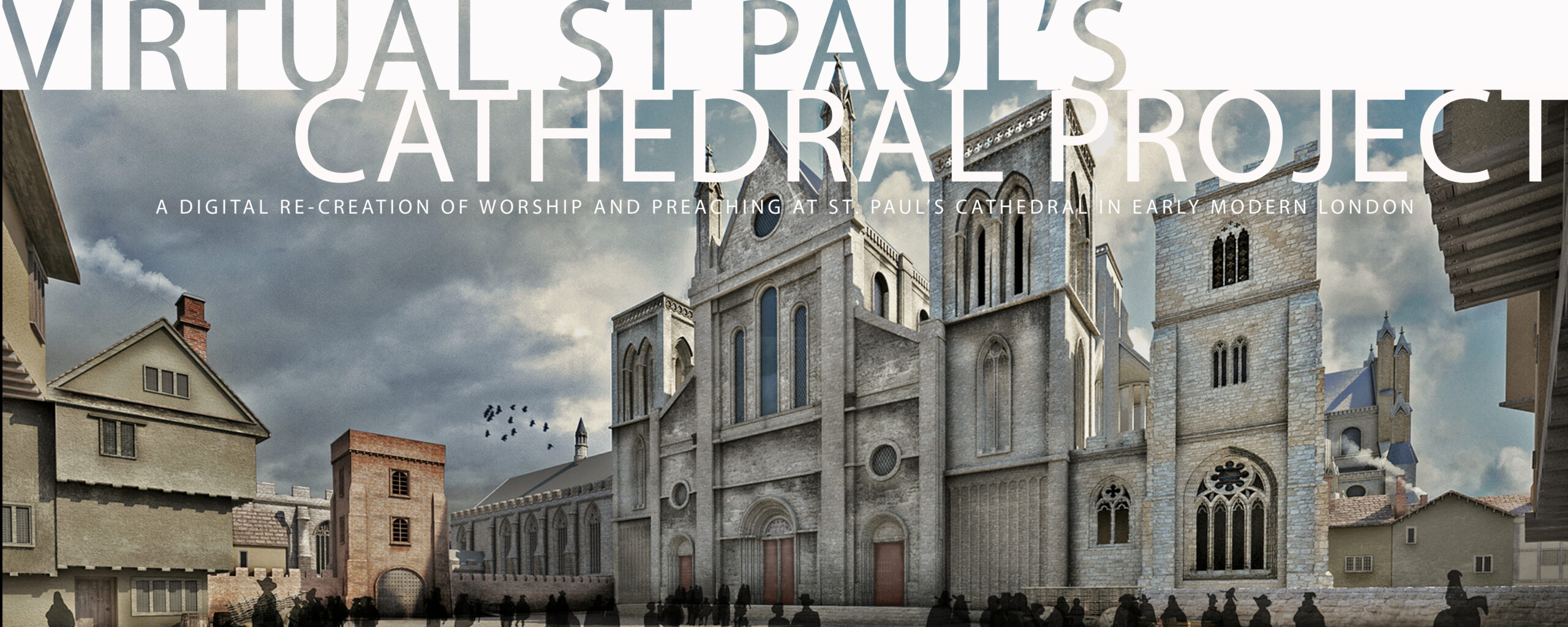There is nothing read in our churches but the canonical Scriptures, whereby it cometh to pass that the Psalter is said over once in thirty days, the New Testament four times, and the Old Testament once in the year. . . . . And, after a certain number of psalms read, which are limited according to the dates of the month, for morning and evening prayer we have two lessons, whereof the first is taken out of the Old Testament, the second out of the New; and of these latter, that in the morning is out of the Gospels, the other in the afternoon out of some one of the Epistles. — William Harrison, A Description of England (1577)
This page of the Cathedral Project website allows the user to experience Advent Evening Prayer from each of the five different Listening Positions we have chosen as representative of the acoustic experience of worship in the Choir of St Paul’s Cathedral during Donne’s tenure as Dean.
At the bottom of this page is an annotated script of this service. To experience all the services from a single Listening Position, go to the Locations page.
Listen from the Dean’s Stall
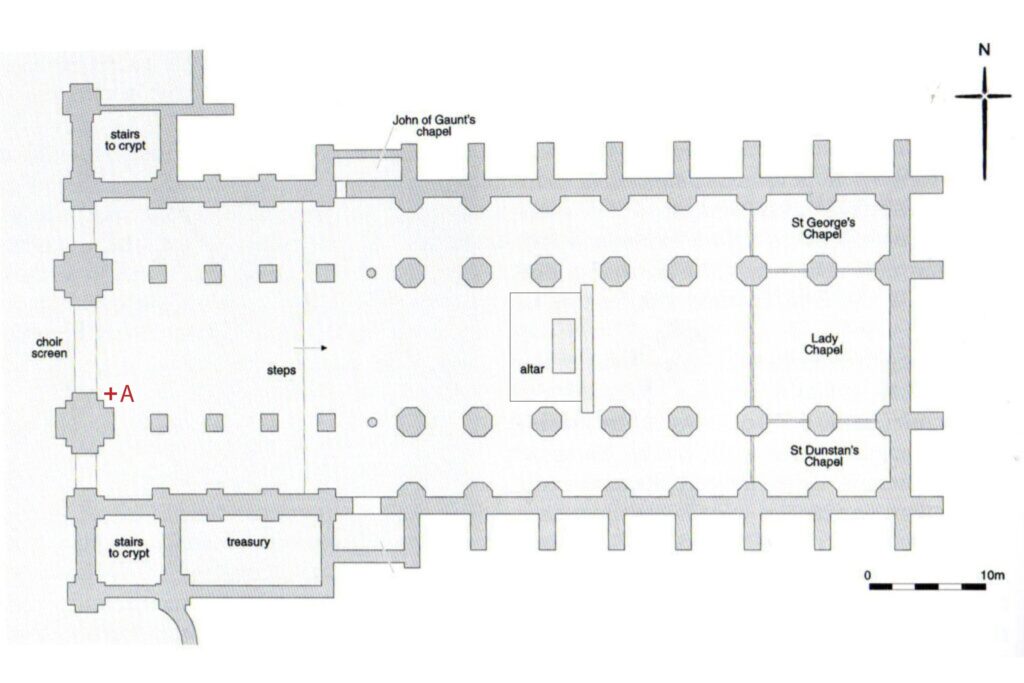
From Midway the Choir
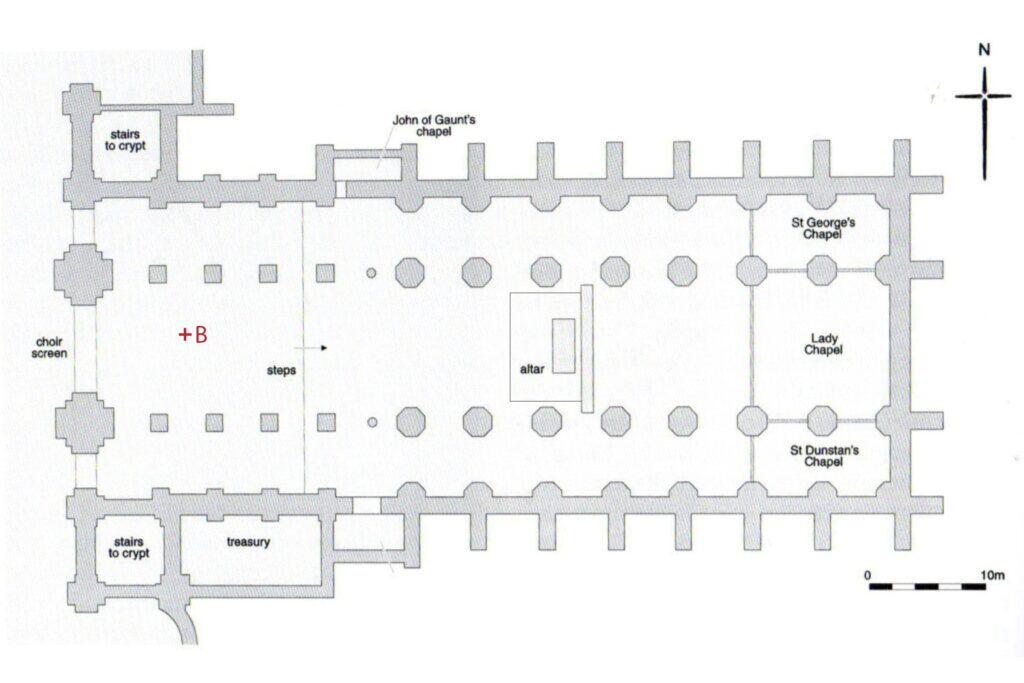
From the Pulpit
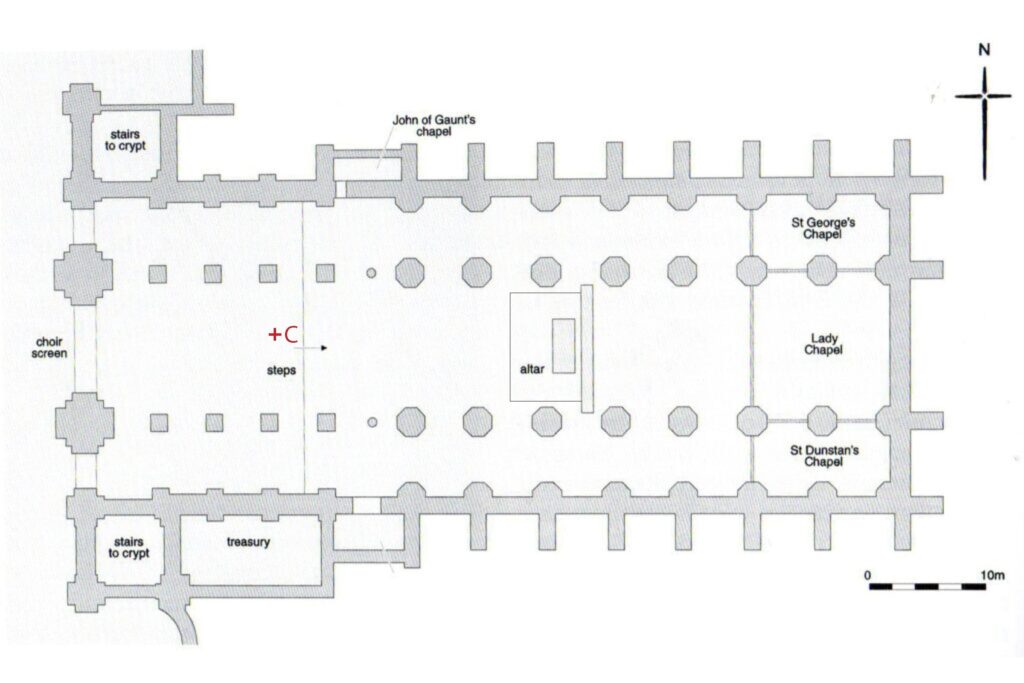
From Midway between the Stalls and the Altar
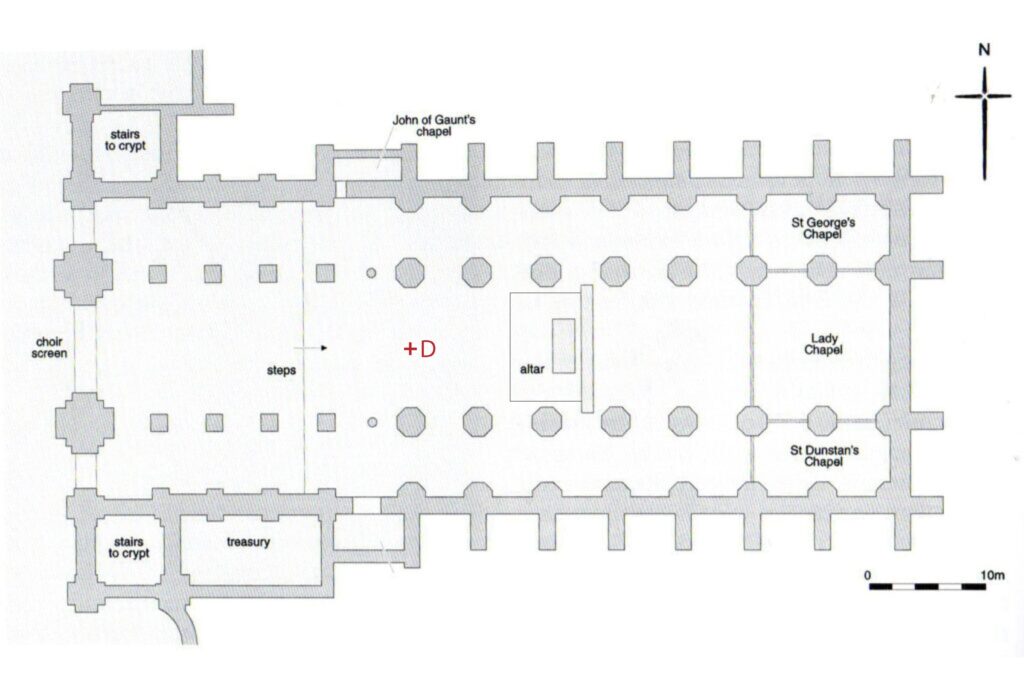
From the South Aisle
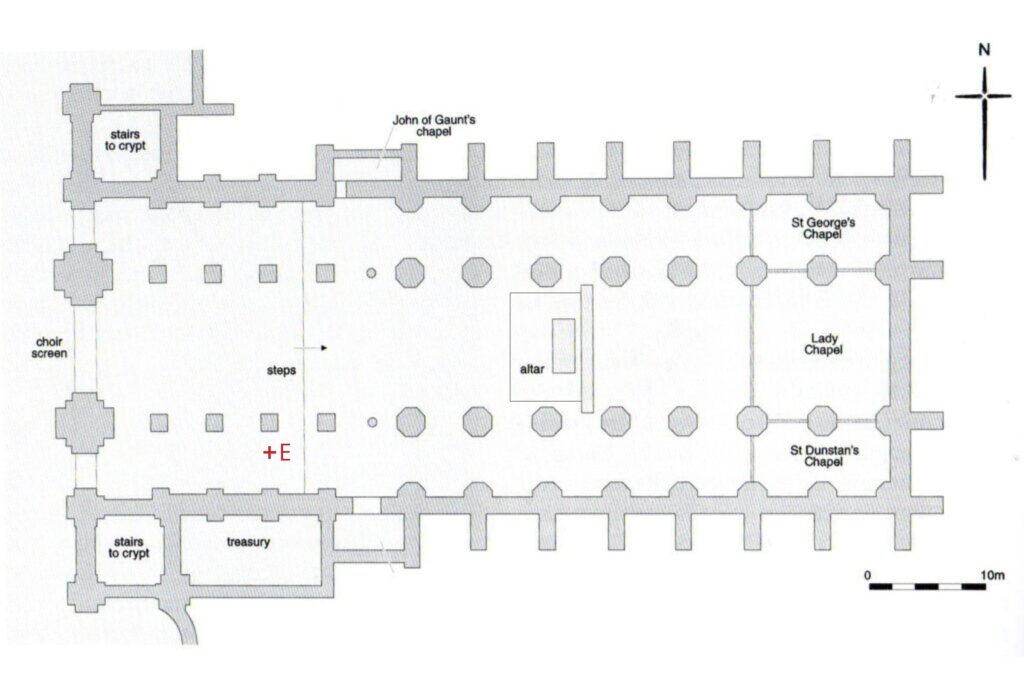
The Annotated Script
Guide to the color coding: The words in black are the words spoken. The words in red are the directions printed in the Book of Common Prayer for the conduct of the service, hence the name rubrics for these directions. The words in blue are the annotations.
EVENING PRAYER
DAYLY THROUGHOUT THE YERE.
This is the script for Evening Prayer on the Tuesday after the First Sunday in Advent in 1625 used to make recordings of this service found elsewhere on this website. Where there are choices to be made in the Rite, only the choices made for these recordings are included. To see the full text of the Rite, consult the Book of Common Prayer in its 1550 or 1604 editions. The easiest way to do this is to consult the edition of the 1559 Prayer Book edited by John E. Booty and published by the University Press of Virginia for the Folger Shakespeare Library, either in the first edition of 1976 or the second edition, with a new Foreword by Judith Maltby, published in 2005.
At the beginning both of Morning Prayer, and lykewyse of Evening Prayer, the Minister shall reade with a lowde voyce, some one of these sentences of the Scriptures that folowe. And then he shall say that, which is written after the said sentences.
Evening Prayer begins with the Officiant’s inviting the congregation to order and setting the tone for the particular occasion by proclaming a verse chosen from a collection of biblical verses found at the beginning of Morning Prayer in the Book of Common Prayer.
The Priest shal saie.
Rende your hartes, and not your garmentes, and turne to the Lorde your God, because he is gentle and mercyful, he is pacient and of muche mercie, and such a one that is sory for your afflictions.
The officiant then invites the congregation to confess their sins “with a humble, lowly, penitent and obedient heart.” The General Confession then follows, leading to the Absolution “and remission of their sins.”
Invitation to Confession
DERELY beloved Brethren, the Scripture moveth us in sondry places, to acknowledge and confesse our manifolde sinnes and wickednes, and that we should not dissemble nor cloke them before the face of almighty God our heavenly father, but confesse them with an humble, lowly, penitent and obedient harte to the ende that we may obtaine forgevenes of the same by his infinite goodnesse and mercie. And although we ought at all tymes humbly to acknowledge our synnes before God, yet ought we moste chiefly so to doe, when we assemble and mete toguether, to rendre thankes for the greate benefites that we have received at his handes, to sette furth his moste worthie praise, to heare his moste holye worde, and to aske those thynges whiche be requisite and necessarie, aswel for the bodye as the soule. wherfore I praye and beseche you, as many as be here presente, to accompany me wyth a pure harte and humble voice, unto the throne of the heauenly grace, saying after me.
Confession
A generall confession, to be said of the whole congregacion after the minister, knelyng.
ALMIGHTIE and most merciful father, we have erred and straied from thy waies, lyke lost shepee we have folowed to much the devises and desires of our owne hartes. We have offended against thy holy lawes: We have left undone those thinges whiche we ought to have done, and we have done those thinges which we ought not to have done, and there is no health in us. But thou, O Lorde, have mercy upon us miserable offendours. Spare thou them O God, whiche confesse their faultes. Restore thou them that be penitent, accordyng to thy promises declared unto mankynde, in Christe Jesu our Lorde. And graunt, O most merciful father, for his sake, that we may hereafter lyve a godly, ryghtuous, and sobre life, to the glory of thy holy name. Amen.
_________________________________________________________________________________
Absolution
The absolution, or remission of sins, to be pronounced by the Minister alone.
ALMIGHTY God, the father of our Lord Jesus Christ, which desireth not the deathe of a sinner, but rather that he maye turne from his wickednesse and lyve: and hath geven power and commaundement to hys Ministers, to declare and pronounce to his people beyng penitent, the absolution and remission of their synnes: he pardoneth and absolveth all them which truly repent, and unfeinedly beleve his holy gospel. Wherefore we beseche him to graunt us true repentaunce and hys holy spirite, that those thynges may please hym, whych we doe at thys present, and that the rest of our life hereafter may be pure and holy so that at the last we may come to his eternall ioye, through Jesus Christe our lorde.
The people shal aunswere.
Amen.
The Lord’s Prayer follows the pronouncing of Absolution. The opening responses then follow, in the form of an interchange between the Officiant and the congregation. The opening “O Lord, open thou our lips; / and our mouth shall show forth thy praise,” is based on Psalm 51. Then follows “O God, make speed to save us” with the response “O Lord, make haste to help us”, a loose translation of the Latin Deus, in adjutorium meum intende which begins every service in the Hour services of the Medieval Church, followed by the Gloria Patri in English.
Then shall the Minister heginne the Lordes Prayer wyth a loude voice.
OUR Father,
_________________________________________________________________________________
Priest + Choir
OUR Father, whiche arte in heaven, hallowed be thy name. Thy kyngdom come. Thy will be done in earth as it is in heaven. Geve us this day our dayly breade. And forgeve us our trespasses, as we forgeve them that trespasse against us. And lead us not into temptacion. But deliver us from evil. Amene.
Amene.
Then likewise he shal saye.
Preces and Responses – Thomas Morley
O Lord open thou our lippes.
Aunswere. And our mouth shall shewe furth thy prayse.
Priest. O God make spede to save us.
Aunswere. Lord, make haste to helpe us.
Glory be to the father, and to the sonne: and to the holy ghoste. As it was in the beginninge, is nowe, and ever shal be : worlde wythout ende. Amen.
Praise ye the Lorde.
The recitation of a portion of the Book of Psalms then follows. Cranmer divided the Psalter into 60 sections. One of these sections is assigned for use at Morning Prayer; another, at Evening Prayer, for each of 30 days. The divisions are assigned consecutively, so that the Psalms are read through from Psalm 1 to Psalm 150 over the course of 30 days. If a month has more than 30 days, the Psalms assigned for Day 30 are repeated on day 31. For February, the Psalms assigned for days 1 through 28 are recited; for a Leap Year, in February the Psalm assigned for days 1 through 29 are assigned. Today, Tuesday, the 29th of November, 1625, the portion of the Psalter assigned is Section 29, assigning Psalms 139, 140, and 141 to Morning Prayer and Psalms142 and 143 for Evening Prayer.
Then Psalmes in ordre, as they be appoincted in the Table for Psalmes, except there be proper Psalmes appointed for that day.
Psalms 142,143 – Plainchant
Psalm 142
1. I cried unto the LORD with my voice; with my voice unto the LORD did I make my supplication.
2 I poured out my complaint before him; I shewed before him my trouble.
3 When my spirit was overwhelmed within me, then thou knewest my path. In the way wherein I walked have they privily laid a snare for me.
4 I looked on my right hand, and beheld, but there was no man that would know me: refuge failed me; no man cared for my soul.
5 I cried unto thee, O LORD: I said, Thou art my refuge and my portion in the land of the living.
6 Attend unto my cry; for I am brought very low: deliver me from my persecutors; for they are stronger than I.
7 Bring my soul out of prison, that I may praise thy name: the righteous shall compass me about; for thou shalt deal bountifully with me.
Glory be to the father, and to the sonne: and to the holy ghoste. As it was in the beginninge, is nowe, and ever shal be : worlde wythout ende. Amen.
Psalm 142
1. Hear my prayer, O LORD, give ear to my supplications: in thy faithfulness answer me, and in thy righteousness.
2. And enter not into judgment with thy servant: for in thy sight shall no man living be justified.
3. For the enemy hath persecuted my soul; he hath smitten my life down to the ground; he hath made me to dwell in darkness, as those that have been long dead.
4 Therefore is my spirit overwhelmed within me; my heart within me is desolate.
5 I remember the days of old; I meditate on all thy works; I muse on the work of thy hands.
6 I stretch forth my hands unto thee: my soul thirsteth after thee, as a thirsty land. Selah.
7 Hear me speedily, O LORD: my spirit faileth: hide not thy face from me, lest I be like unto them that go down into the pit.
8 Cause me to hear thy lovingkindness in the morning; for in thee do I trust: cause me to know the way wherein I should walk; for I lift up my soul unto thee.
9 Deliver me, O LORD, from mine enemies: I flee unto thee to hide me.
10 Teach me to do thy will; for thou art my God: thy spirit is good; lead me into the land of uprightness.
11 Quicken me, O LORD, for thy name’s sake: for thy righteousness’ sake bring my soul out of trouble.
12 And of thy mercy cut off mine enemies, and destroy all them that afflict my soul: for I am thy servant.
Glory be to the father, and to the sonne: and to the holy ghoste. As it was in the beginninge, is nowe, and ever shal be : worlde wythout ende. Amen.
An organ voluntary is inserted here, following the pattern described by James Clifford in his The divine services and anthems usually sung in His Majesties chappell and in all cathedrals and collegiate choires in England and Ireland (London, 1664).
A Voluntary upon the Organ
Cranmer, in his introduction to the 1549 Book of Common Prayer, explained that one major purpose of the Prayer Book Offices was to provide course readings of the Bible, reading through from the beginning to the end of each Book. To achieve this, Cranmer followed the organization of the Bible into Books with chapters and assigned one chapter of a Book of the Old Testament (including the Apocrypha) and one chapter of a book of the New Testament for reading at Morning Prayer and at Evening Prayer for each day of the year. As a result, excpt for some omissions (such as most of the Book of Relevation), the early modern Church read the Old Testament through once a year and the New Testament through three times a year. Together with the monthly recitation of the entire Book of Psalms, this practice was Cranmer’s chief way of responding to his fellow Reformers’ emphasis on Scripture. To make the Bible available for use in Church worship, the Great Bible was, initially, published only in folio, intended to be placed on its own lectern in each church and cathedral. Today being the 29th of November 1625, the Lessons read are those assigned for the 29th day of the month of November.
Then a Lesson of the olde Testament, as is appointed likewise in the kalender, except there be propre lessons appointed for that day. After that, Magnificat in Englishe, asfoloweth.
The thirteenth Chapter of Isaiah
1. The burden of Babylon, which Isaiah the son of Amoz did see.
2 Lift ye up a banner upon the high mountain, exalt the voice unto them, shake the hand, that they may go into the gates of the nobles.
3 I have commanded my sanctified ones, I have also called my mighty ones for mine anger, even them that rejoice in my highness.
4 The noise of a multitude in the mountains, like as of a great people; a tumultuous noise of the kingdoms of nations gathered together: the LORD of hosts mustereth the host of the battle.
5 They come from a far country, from the end of heaven, even the LORD, and the weapons of his indignation, to destroy the whole land.
6 Howl ye; for the day of the LORD is at hand; it shall come as a destruction from the Almighty.
7 Therefore shall all hands be faint, and every man’s heart shall melt:
8 And they shall be afraid: pangs and sorrows shall take hold of them; they shall be in pain as a woman that travaileth: they shall be amazed one at another; their faces shall be as flames.
9 Behold, the day of the LORD cometh, cruel both with wrath and fierce anger, to lay the land desolate: and he shall destroy the sinners thereof out of it.
10 For the stars of heaven and the constellations thereof shall not give their light: the sun shall be darkened in his going forth, and the moon shall not cause her light to shine.
11 And I will punish the world for their evil, and the wicked for their iniquity; and I will cause the arrogancy of the proud to cease, and will lay low the haughtiness of the terrible.
12 I will make a man more precious than fine gold; even a man than the golden wedge of Ophir.
13 Therefore I will shake the heavens, and the earth shall remove out of her place, in the wrath of the LORD of hosts, and in the day of his fierce anger.
14 And it shall be as the chased roe, and as a sheep that no man taketh up: they shall every man turn to his own people, and flee every one into his own land.
15 Every one that is found shall be thrust through; and every one that is joined unto them shall fall by the sword.
16 Their children also shall be dashed to pieces before their eyes; their houses shall be spoiled, and their wives ravished.
17 Behold, I will stir up the Medes against them, which shall not regard silver; and as for gold, they shall not delight in it.
18 Their bows also shall dash the young men to pieces; and they shall have no pity on the fruit of the womb; their eye shall not spare children.
19 And Babylon, the glory of kingdoms, the beauty of the Chaldees’ excellency, shall be as when God overthrew Sodom and Gomorrah.
20 It shall never be inhabited, neither shall it be dwelt in from generation to generation: neither shall the Arabian pitch tent there; neither shall the shepherds make their fold there.
21 But wild beasts of the desert shall lie there; and their houses shall be full of doleful creatures; and owls shall dwell there, and satyrs shall dance there.
22 And the wild beasts of the islands shall cry in their desolate houses, and dragons in their pleasant palaces: and her time is near to come, and her days shall not be prolonged.
Here endeth the thirteenth Chapter of Isaiah
At Morning and Evening Prayer, after each of the lessons from the Bible, a canticle or hymn is sung. At Evening Prayer, these are usually the Canticle Magnificat from the Gospel of Luke after the Old Testament reading and the canticle Nunc Dimittis, also from the Gospel of Luke, after the New Testament reading. Psalm 98, Cantata domino, is provided as a potential alternative to the Magnificat; Psalm 67 (Deus misereatur) is provided as an alternative to the Nunc Dimittis.
Magnificat (4th Service) – Adrian Batten
MY soule doeth magnifie the Lorde.
And my sprit hath rejoysed in god my saviour.
For he hath regarded the loweliries of his handmaiden.
For beholde from hencefurth al generacions shall call me blessed.
For he that is mightie hath magnified me : and holy is his name.
And his mercy is on them that feare him : throughout all generacions.
He hath shewed strength with his arme; he hath scatered the proude in the imagination of their hertes.
He hath put downe the mightye from theyr seate : and hath exalted the humble and meke.
He hath filled the hungry with good thinges : and the ryche he hath sent empty away.
He remembring his mercy, hath holpen his servaunte Israel as he promysed to our forefathers, Abraham and his sede for ever.
Glory be to the Father, and to the sonne, [and to the holy Ghoste]*.
As it was in the beginninge, is nowe, [and ever shalbe, world without ende. Amen.]*
Then a lesson of the New Testament.
The fifth Chapter of Hebrews
1. For every high priest taken from among men is ordained for men in things pertaining to God, that he may offer both gifts and sacrifices for sins:
2 Who can have compassion on the ignorant, and on them that are out of the way; for that he himself also is compassed with infirmity.
3 And by reason hereof he ought, as for the people, so also for himself, to offer for sins.
4 And no man taketh this honour unto himself, but he that is called of God, as was Aaron.
5 So also Christ glorified not himself to be made an high priest; but he that said unto him, Thou art my Son, to day have I begotten thee.
6 As he saith also in another place, Thou art a priest for ever after the order of Melchisedec.
7 Who in the days of his flesh, when he had offered up prayers and supplications with strong crying and tears unto him that was able to save him from death, and was heard in that he feared;
8 Though he were a Son, yet learned he obedience by the things which he suffered;
9 And being made perfect, he became the author of eternal salvation unto all them that obey him;
10 Called of God an high priest after the order of Melchisedec.
11 Of whom we have many things to say, and hard to be uttered, seeing ye are dull of hearing.
12 For when for the time ye ought to be teachers, ye have need that one teach you again which be the first principles of the oracles of God; and are become such as have need of milk, and not of strong meat.
13 For every one that useth milk is unskilful in the word of righteousness: for he is a babe.
14 But strong meat belongeth to them that are of full age, even those who by reason of use have their senses exercised to discern both good and evil.
Here endeth the fifth Chapter of Hebrews
Nunc Dimittis (4th Service) – Adrian Batten
And after that (Nunc dirnittis) in Englyshe, as foloweth.
LORDE, nowe lettest thou thy servaunt departe in peace : according to thy worde.
For myne eyes have sene : thy salvacion.
Whiche thou haste prepared : before the face of all people;
To be a lyght to lyghten the Gentiles : and to be the glorye of thy people Israell.
Glorye be to the father, and to the sonne, [and to the holy ghoste.]*
As it was in the beginning, is nowe, [and ever shall be, worlde withoute ende. Amen.]*
On most occasions at this point in both Morning and Evening Prayer, the Apostles Creed is recited. At the service of Holy Communion, the Nicene Creed is recited.
Then shal folow the Crede, with other prayers, as is before appoynted at Morning prayer, after Benedictus.
I BELEVE in God the father almightie maker of heaven and earth. And in Jesus Christ hys onely sonne our Lorde, which was conceived by the holy ghoste, borne of the Virgen Mary. Suffred under Ponce Pylate, was crucified dead and buried, he descended into Helle. The thirde daye he rose agayn from the deade. He ascended into heaven, and sitteth on the ryghte hande of God the Father almightie. From thence he shall come to judge the quicke and the deade. I beleve in the holy Ghoste. The holy Catholique Churche. The communion of sainctes. The forgevenesse of sinnes. The resurrection of the body. And the life everlasting. Amen.
After the Creed, the Officiant invites the congregation to recite the Kyrie eleison (“Lord, have mercy upon us”). The Lord’s Prayer then follows, then the versicles and responses, with their emphasis on prayers for civil and religious authorities, including prayers for the King, secular authorities and ministers of the church, and all its people, for peace, and for purity of heart. Then the Officiant prays three prayers, or Collects. The first is the Collect assigned for the specific day of the year, in this case Easter Sunday. The second is a Collect for Peace; the third, for Grace.
And after that, these prayers folowyng, aswell at Evenyng praier as at Mornyng prayer: al devoutlye knelyng. The Minister firste pronouncinge with a loude voyce.
Preces and Responses – Thomas Morley
The Lorde be with you.
Answer. And with thy spirite.
Minister. Let us praie.
Lorde have mercy upon us.
Christ have mercy upon us.
Lorde have mercy upon us.
Then the Minister, Clarkes, and people; shall saye the Lordes praier in Englyshe, with a loud voice.
OUR Father, whiche arte in heaven, hallowed be thy name. Thy kyngdom come. Thy will be done in earth as it is in heaven. Geve us this day our dayly breade. And forgeve us our trespasses, as we forgeve them that trespasse against us. And lead us not into temptacion. But deliver us from evil. Amene.
Then the Minister; standing up shal say.
O lorde, shewe thy mercy upon us.
Aunswere. And graunte us thy salvacion.
Prieste. O Lorde save the King.
Aunswere. And mercifully here us when we call upon the.
Prieste. Endue thy ministers with rightuousnes.
Aunswere. And make thy chosen people joyful.
Prieste. O Lorde save thy people.
Aunswere. And blesse thyne enheritaunce.
Prieste. Geve peace in our tyme, O Lorde.
Aunswere. Because there is none other that fyghteth for us, but onely thou, O God.
Prieste. O God make clene our hartes with in us.
Aunswere. And take not thy holy spirite from us.
Then shall follow three Collectes: Fyrste of the day, the seconde of peace, the thyrde for ayde agaynste all peryls, as hereafter foloweth, whiche two last Collectes shabe daylye sayde at Evenyng Prayer wythout alteracion.
The Collect.
ALMYGHTYE God, geve us grace, that we may cast awaye the workes of darknes, and put upon us the armour of light, now in the tyme of this mortall lyfe, (in the whiche thy sonne Jesus Christe came to visite us in great humilitie;) that in the last daye when he shal come again in his glorious majestye to judge bothe the quicke and the dead, we maye ryse to the lyfe immortal, through him who liveth and reigneth with thee and the holy ghoste now and ever.
Amen.
The seconde Collecte at Evenynge Prayer.
O GOD, from whome all holy desires, all good counsailes, and all just woorkes do procede: geve unto thy servauntes that peace, whiche the worlde cannot geve: that bothe our hertes may be set to obey thy commaundementes, and also that by thee, we beynge defended from the feare of our enemies, may passe our time in rest and quietnes. Through the merites of Jesus Chryste our saviour.
Amen.
The thyrde Collecte for ayde, against all peryls.
LYGHTEN oure darckenesse, wee beseche thee (O Lorde,) and by thy greate mercye defende us from all perils and daungers of this nyghte, for the love of thy onely sonne oure Savioure Jesus Christe.
Amen.
Directions for worship issued as part of the Elizabethan Settlement of Religion in 1559 included the provision that “for the comforting of such that delight in music, it may be permitted, that in the beginning, or in the end of common prayers, either at morning or evening, there may be sung an hymn, or suchlike song to the praise of Almighty God.” As a result, the practice developed of inserting at thispoint in the service an anthem, or piece of religious music, chosen by the Choirmaster. The Prayer Book of 1662, puts tue custom thus: “In Quires and Places where they sing here followeth the Anthem.
Anthem — Deliver us, O Lord God – Adrian Batten
An organ voluntary is inserted here, following the pattern described by James Clifford in his The divine services and anthems usually sung in His Majesties chappell and in all cathedrals and collegiate choires in England and Ireland (London, 1664).
Organ Voluntary
